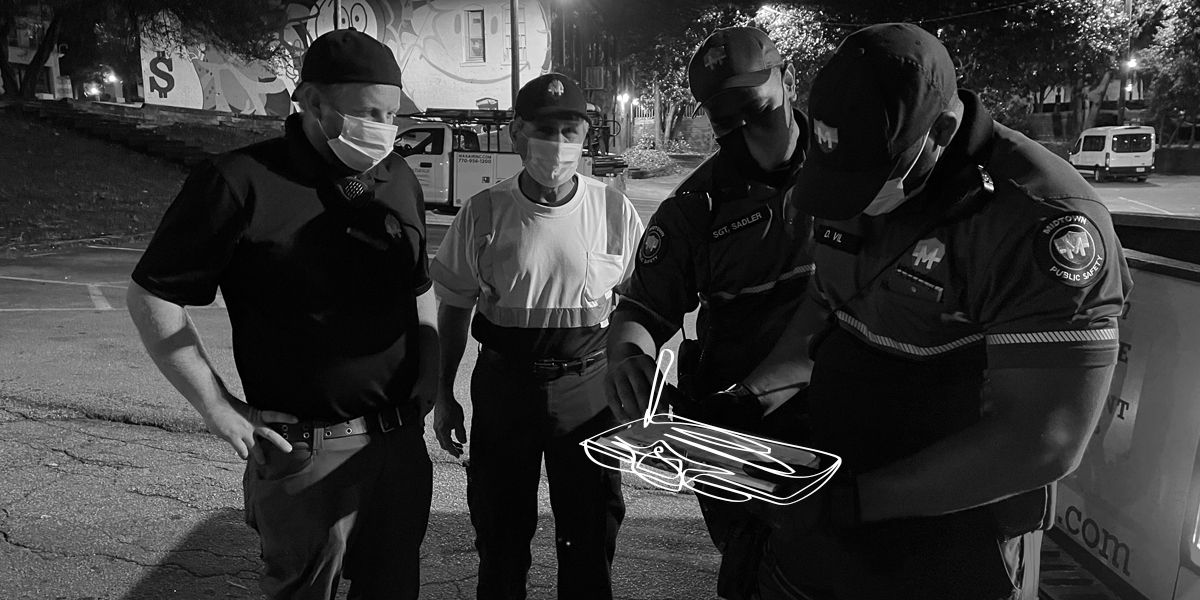Untangling Homelessness: Midtown Blue and PAD Partnership Accelerates Supportive Housing Efforts
Published: 10/07/21

It takes teamwork and coordination to solve an issue as complex as homelessness.
PAD works to reduce arrest and incarceration for people experiencing extreme poverty, substance abuse or mental health concerns. Its street team members work with people to address their basic needs and to reduce harm to themselves and others.
One Call, That’s All: More About How PAD’s Program Works
 PAD’s program has two core components: its law enforcement assisted diversion approach (LEAD) and its citizen referrals. When a police officer diverts a person to PAD, the individual must be committing an offense that could have resulted in an arrest. For this reason, Midtown Blue Public Safety Officers must call in a coworker who is an off-duty APD officer to make the actual referral, as Midtown Blue PSOs do not have powers of arrest.
PAD’s program has two core components: its law enforcement assisted diversion approach (LEAD) and its citizen referrals. When a police officer diverts a person to PAD, the individual must be committing an offense that could have resulted in an arrest. For this reason, Midtown Blue Public Safety Officers must call in a coworker who is an off-duty APD officer to make the actual referral, as Midtown Blue PSOs do not have powers of arrest.
“It all starts with the officer, who has the choice to either arrest the person or divert them to PAD,” White said. “When I train them, I ask them, ‘what is the better public safety approach?’ You can send them to jail, only to have them get out and commit the same offense again, or you can get their needs met, and there’s a large chance you won’t see them again.”
In 2021, PAD also introduced a community referral program through ATL 311. Now, residents in every zone of the City of Atlanta can call the city’s 311 non-emergency line to report quality of life concerns, and PAD’s Harm Reduction Team will respond quickly by finding the individual and getting them help.
Any quality of life issues involving a person’s welfare, whether resulting in a law infraction or not, may be called in through the city’s 311 line Monday through Friday, from 7 a.m. to 7 p.m.
PAD’s Harm Reduction Team is dispatched as soon as possible after the call is made in order to address any emergent needs. After that, individuals are assigned a care manager, who acts as a case manager to provide long-term support such as a linkage to medical care services, mental health treatment and substance abuse treatment.
Training and Strategy Tweaks Yield Recent Wins

“We have a strong relationship with Atlanta Police Department’s Zone 5 [where Midtown is located], and we know there are quality of life issues in Zone 5,” said Denise White, executive director of PAD. “We had previously provided training to Midtown Blue, and we wanted to strengthen our relationship.”
“Our officers are now better equipped to utilize PAD when they encounter and individual who is committing an offense, typically involving a quality of issue and there is a need related to substance abuse, mental health or extreme poverty,” said Marcus Neville, director of public safety at Midtown Alliance. “We feel like the partnership is very successful and we are appreciative that they have expanded their capabilities this year.”
Midtown Alliance staff recently conducted an informal count of unsheltered individuals in the district and counted about 50 people. The number has dropped from 74 people a few years ago, due in part to the City’s efforts to house unsheltered individuals.
For context, the City of Atlanta counted 2,679 unsheltered individuals within city limits during its last Point in Time Count in January 2023.
Getting someone experiencing homelessness to accept help isn’t easy. It often takes up to 15 interactions before enough trust is established with someone that they are willing to accept help.
Lots of work remains to be done, and not all of the referrals made to PAD will ultimately be success stories. Every unsheltered person’s story is different with many battling mental illness or controlled substances, and others suffering as victims of domestic abuse. Our Midtown Blue team will continue to work with partners to learn individuals’ stories, meet them where they are and establish enough trust to where they are willing to accept help.
Diversion Approach Can be Life-Changing
When individuals finally accept help from the PAD, the results can be incredible. White said one man from Zone 5 who was diverted to PAD’s program has thrived so much that he now goes to police training sessions with White to give his testimonial to the officers.
“It really came full circle for me,” White said. “I wonder where he would be if he wasn’t diverted to PAD by an APD officer. That’s probably one of our greatest success stories. At this point I think of him as a colleague.”
Learn more about PAD here.
Get the Facts About Homelessness in Midtown
 More work remains to be done on the issue of homelessness in Atlanta. Get the facts and learn more about the issue - and what Midtown Alliance and its partners are doing - by reading these stories from our Untangling Homelessness investigative series:
More work remains to be done on the issue of homelessness in Atlanta. Get the facts and learn more about the issue - and what Midtown Alliance and its partners are doing - by reading these stories from our Untangling Homelessness investigative series:
Catch up on the other stories we've researched and developed for this series: